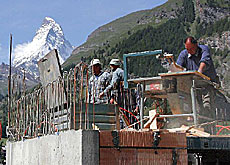Unions say wage dumping is now reality

Trade unions say the lifting of labour restrictions on European Union nationals looking for work in Switzerland has led to downward pressure on wages.
The Swiss government admits that wage dumping has become a problem in some cantons, but denies that it is widespread.
On June 1 the second phase of a bilateral accord with Brussels came into effect, removing the priority previously given to Swiss workers in the domestic labour market.
At the time, union leaders warned that the easing of restrictions would lead to a slide in salaries, particularly in border regions.
The accord gives citizens from 15 EU member states the right to work in Switzerland without applying for a work permit. Nationals from the ten new EU countries, which joined on May 1, will likely have to wait several more years before they gain access to the Swiss labour market.
Union leaders in canton Ticino have already made it clear they will push for a referendum to try and prevent the accord from being extended to include the new member states.
They say they want to discuss plans to force a nationwide vote on the issue when four of the country’s trade unions join forces in the middle of October.
Union warning
Serge Gaillard, chief economist at the Swiss Federation of Trade Unions, said the number of businesses employing workers on lower wages had increased since the accord came into effect.
Trade unions say they are most concerned about wage dumping in the construction sector, which employs more than 30 per cent of foreign workers in Switzerland.
“Many companies, particularly in the construction industry and in construction-related sectors, [are given sub-contracts by Swiss firms] and come here with their employees but do not pay them local wages,” said Gaillard.
Hans Rudolf Gysin, a parliamentarian from the centre-right Radical Party and director of canton Basel Country’s Chamber of Commerce, said it had become easier for foreign firms to fulfil contracts in Switzerland without informing the authorities.
“There are just too few control mechanisms,” said Gysin, “and I would have to say that the situation regarding wage dumping has got worse.”
“Around 20 per cent of foreign firms [in canton Basel Country] have been found guilty of wage dumping.”
According to Gysin, one of the worst cases to be uncovered in Basel was that of a foreign worker “who was paid a salary of SFr15 [per hour] instead of the SFr27 required in the contract… which is a difference of 55 per cent”.
Not widespread
For their part, the Swiss authorities say they have observed only limited evidence of wage dumping.
“Some cantons have had problems… but I think it’s a bit too early to talk about an overview of the situation,” said Mario Tuor of the Federal Office for Immigration, Integration and Emigration.
A detailed report on the impact of the accord and the influx of foreign workers on the labour market is due to be published by the end of the year.
Since June 1, the Swiss parliament has required the country’s 26 cantons to set up their own commissions to monitor the labour market and take action if cases of wage dumping are uncovered.
But Gaillard said that many of the commissions had not yet been established and that proper checks were still not being carried out.
“Many cantons have not yet started carrying out controls, because it was not common in Switzerland for the authorities to investigate working conditions,” he said.
Gaillard has called for the introduction of a national minimum wage if nothing can be done about the downward pressure on salaries.
Union leaders in Switzerland say they are working closely with their counterparts in European Union member states to combat the problem.
swissinfo, Katalin Fekete
One in four workers in Switzerland is a foreign national.
Just under 60% of the foreign workers in Switzerland come from the EU.
The construction industry and the health sector rely heavily on foreign workers.
The second phase of the bilateral agreement on the free movement of people came into effect on June 1, 2004.
EU citizens can take up a job in Switzerland without applying for a work permit.
Union leaders says this had led to cases of wage dumping, particularly in border regions.

In compliance with the JTI standards
More: SWI swissinfo.ch certified by the Journalism Trust Initiative




You can find an overview of ongoing debates with our journalists here . Please join us!
If you want to start a conversation about a topic raised in this article or want to report factual errors, email us at english@swissinfo.ch.